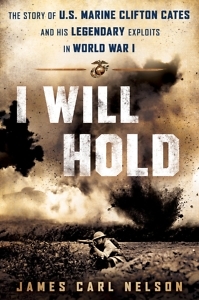Marine Corps Hero
Historian James Carl Nelson follows a young Tennessee soldier on the front lines of World War I
James Carl Nelson, a journalist who has written several other books related to Word War I, centers his new narrative history on Clifton Cates, a University of Tennessee law-school graduate who joined the Marines just as the U.S. entered the Great War. Nelson’s I Will Hold is a closely focused, trench-and-bullet-level treatment of the war in France as it intensified before finally grinding to a close.
 Prior to 1917, the Marine Corps was traditionally a small fighting force, but during the rapid military build-up in the spring of 1917 it began to recruit aggressively. Cates, a Tiptonville native who had just graduated from law school at the University of Tennessee, eagerly enlisted. After training at Parris Island and Quantico, and enduring many frustrating delays, Second Lieutenant Cates found himself leading a platoon in the front-line trenches under General John J. Pershing, commander in chief of the American Expeditionary Force in Europe.
Prior to 1917, the Marine Corps was traditionally a small fighting force, but during the rapid military build-up in the spring of 1917 it began to recruit aggressively. Cates, a Tiptonville native who had just graduated from law school at the University of Tennessee, eagerly enlisted. After training at Parris Island and Quantico, and enduring many frustrating delays, Second Lieutenant Cates found himself leading a platoon in the front-line trenches under General John J. Pershing, commander in chief of the American Expeditionary Force in Europe.
Cates was enthusiastic about the Marines and his own participation in the war. In an early letter home, he wrote that it was “a wonderful thrill to be out there in front of a bunch of men that will follow you to death.” Even the machinery of war failed to daunt him: “It is a wonderful life [and] a grand and glorious feeling to hear the shells whizzing over,” he wrote. Only after many months of brutal combat, during which he witnessed unimaginable death and destruction, did his upbeat attitude begin to fade, just as the armistice was signed.
 He was clearly a perfect fit in the Marine Corps, however, and won numerous medals for heroism and bravery, including a Purple Heart and a Silver Star, in a variety of engagements. His success in battle stemmed partly from his legendary luck at dodging bullets as those around him were slaughtered. Cates’s dedication to the Corps, as well as his steadiness and bravery in battle, led to many promotions and ultimately to a career in the Marines that lasted well beyond World War II. From 1948 to 1952 he served as the Marine Commandant, in which role he fought his last fight, a political one, to ensure the Marines’ independence as a branch of the military.
He was clearly a perfect fit in the Marine Corps, however, and won numerous medals for heroism and bravery, including a Purple Heart and a Silver Star, in a variety of engagements. His success in battle stemmed partly from his legendary luck at dodging bullets as those around him were slaughtered. Cates’s dedication to the Corps, as well as his steadiness and bravery in battle, led to many promotions and ultimately to a career in the Marines that lasted well beyond World War II. From 1948 to 1952 he served as the Marine Commandant, in which role he fought his last fight, a political one, to ensure the Marines’ independence as a branch of the military.
I Will Hold relies on and quotes from an impressive array of regimental histories, memoirs, and letters from Cates himself, those around him, and others fighting in France. Nelson provides intimate pictures of trench warfare and its hardships and danger. Emerging from the trenches (“going over the top”) to assault the enemy in the face of withering machine-gun fire took a powerful mixture of patriotism and testosterone, and the resulting brutalities of war—artillery barrages, gassing and its effects, blood and casualties, and the like—are portrayed here in graphic detail.

Ralph Bowden, who holds a Ph.D. from the University of North Carolina, has worked as an electrical engineer, history professor, home builder, alternative-energy consultant, and technical writer. A former resident of both Knoxville and Chattanooga, he lives in Cookeville.


